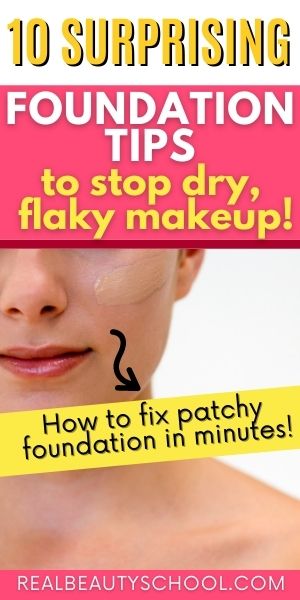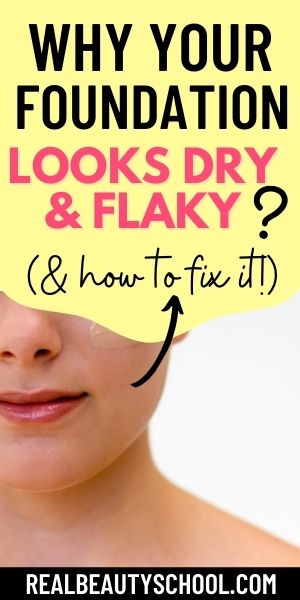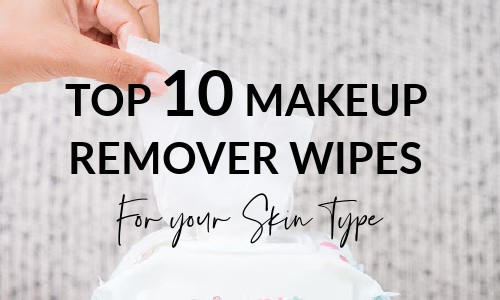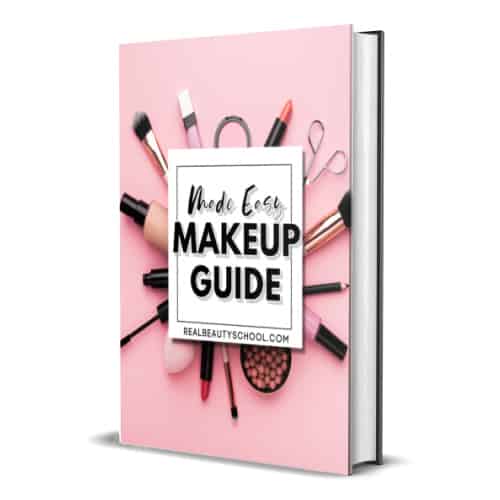
Valeria H. is Real Beauty School’s Senior Beauty Editor and the instructor behind our makeup lessons. She’s passionate about sharing beauty tips, trends, and tutorials for newbies. She’s an experienced makeup artist and also the author of the popular makeup book, “Makeup Made Easy” and when she’s not crafting the perfect makeup tutorial or diving deep into the latest beauty trends, you can find her enjoying her favorite latte with a cozy blanket and watching Netflix
You apply your foundation, looks wonders the first 5 min. And suddenly, yo started to see some areas with patchyness, flaky dry areas around your nose or maybe chinm, and you are wondering, why your foundation looks dry and flaky?
It could be many reasons. It could be a combination of one, two or three of the no action on some.
I’m a Makeup Artist, and in this article we are gonna talk about the 10 most common reasons your foundation gets flaky, patchy, dry and/or cakey.
Maybe by this time, you have even tried different makeup foundation brands to fix the problem, and your foundation still look cracked or separated.
Well, you are not alone.
I’ve been there!
and a lot of women struggle with dry and flaky foundation, but many are making skincare sins without even realizing it.
If you are ready to say goodbye to dry and flaky foundation, find out exactly why it happens in the first place, and most importantly, what you can do to fix it; keep on reading.
We will be diving into all of these topics and more below.

Why is my foundation flaky?
Your makeup foundation might look flaky because your skincare routine is not pairing with your skin type, you are not exfoliating your skin often, or you are not preparing your skin properly before your foundation.
It might be that you are applying too much foundation, and/or you are wearing the wrong foundation for you or even the wrong concealer.
But don’t worry!
Let’s start with reason #1…
1. Your skincare routine is not helping your skin
One reason that your foundation looks dry and/or flaky is that you are not taking care of your skin properly.
Some people do not even know their skin type or use products that are for a different skin type.
If this is your case, you might actually be making your skin worse by using or NOT using some skincare products.
Before we dive into a few great products for your skin type, you must figure out what your skin type is!
And it is even more straightforward than you may think.
-> If you already know your skin type, and you have a established skincare routine, skip this section and scroll to the next most common reason.
How do you identify your skin type?

All you need to do is grab a blotting sheet and dab it on different areas of your face.
When you hold the sheet up to the light, if there is little to no oil visible on the sheet, you probably have dry skin.
If there is a lot of oil on the sheet, then you probably have oily skin.
Finally, if oil only showed up on the part of the sheet, then you probably have combination skin.
Now that you know your skin type let’s look at a couple of must-have products designed specifically for you.
Skincare products for dry skin

This post may contain affiliate links. That means if you click and buy, I may receive a small commission (at zero cost to you). Please see my full disclosure policy for details.
The most important thing for dry skin is to have a great moisturizer, and the Eucerin one is a good option because it is a dermatologist recommended and it is super affordable! (check it here)
- Neutrogena Hydroboost Hydrating Gel cream: This product is awesome because it hydrates the skin without making it feel too oily.
Whether you choose Neutrogena or not, having a hydro-boosting product in your skincare routine will do wonders for your face! (check it here)
- CeraVe Hydrating Facial Cleanser: This face wash has been rated the best overall face wash for dry skin by several beauty experts,
and the best part is that it is super cheap on Amazon (check price here). Talk about a great deal!
For Dry skin, I would also add a Face Oil like this one by Ordinary as an essential to create a barrier on your skin that locks all the moisture you apply and helps rehydrates the skin over time.
This step is a must-do!
Skincare products for oily skin

- Neutrogena Oil-Free Acne Fighting Face Wash: This product is awesome for oily skin because it is an oil-free face wash.
No matter what product you choose, make sure you are picking one that is oil-free so that you aren’t adding more oil to your skin! (check it here)
- Bioderma Sebium Foaming Gel Pump for combination to oily skin: This face wash is so great! Because it is light, doesn’t dry your skin, and limits the sebum secretion!
It removes the oil from your face without over-stripping it.
I and the other 5,000 reviewers here can tell you how good it is!
Remember that sometimes oily skin can be super dehydrated skin, and that’s why your skin is producing an excess of oil.
Make sure to always moisturize your skin, no matter how oily it is!
Now that you have found your skin type, and the best skincare steps you should be doing for your skin type,
and still finding your foundation flaky or cakey,
let’s get to the second most common reason this might be happening…
–>Related: Here’s a simple skincare routine for beginners (by skin type)
2. You are not exfoliating your skin

Based on expert opinions made by dermatologists, another reason that your foundation may be flaky and dry is that you are not exfoliating your skin enough.
There are so many reasons why exfoliating your skin is so important,
but it also helps your foundation (and the rest of your makeup) blend into your skin properly, remove dead skin cells and avoid flaky, patchy makeup.
Exfoliators unclog your pores and smooth out your skin, which result in a better chance of a smoother foundation finish
The smoother that your skin is, the nicer that your makeup is going to look because it can adhere better to your skin!
How to exfoliate your skin properly
Even if you are exfoliating your skin, you might not be doing it the right way for smooth makeup!
For your makeup to blend into your skin, you have to exfoliate your skin between 2-3 times a week.
If you are not doing it, I’d highly encourage you to try it out! You’ll see the difference since the first time.
IMPORTANT: When you are exfoliating, be sure to use a liquid exfoliator instead of a physical exfoliator that can harsh your skin.
- For combination to oily skin the salicylic Acid by Paula’s Choice is the best option!
- For Normal to dry skin the amazing The Ordinary Lactic Acid 5% is the best option!
Check this amazing guide below from two dermatologists!
now that we know our skin type, the best skincare routine for our skin, and how to exfoliate our skin, let’s get to another reason we still might have flaky skin after applying our foundation…
3. You didn’t prep your skin
If you have been doing all of these things and your foundation still doesn’t look flawless,
you might be missing a step in your makeup routine.
Doing a skincare routine daily and also wearing a primer before foundation is the best way to prep your skin for a perfect-looking foundation.
–Mac cosmetics experts
It creates a smooth barrier between your skin and the makeup products that will blend them perfectly.
But, there are different primers for different skin types. AND wearing the WRONG PRIMER IS ALSO ANOTHER REASON TO GET PATCHYNESS WITH YOUR FOUNDATION.
- For dry skin, using a hydrating primer like this one will ensure that your face is hydrated and healthy before applying that foundation.
- For oily skin, using a mattifying primer or a translucent powder like this one is the best way to go.
- Finally, for combination skin, or if you have big pores, this primer here is perfect for beautiful skin!
PRO TIP: Apply setting spray before your foundation: If you are looking for another quick tip for a flawless foundation, setting spray is a great way to lock in your primer before you put on your foundation!
Related post: Exactly what to apply on your face before Makeup for flawless Makeup Application!
Now let’s get into the next most common reason your foundation might look flay, patchy, or cakey…
4. You are using the wrong foundation formula for your skin
While we have looked at so many great changes to make to your skincare and makeup routine to fix your dry and flaky foundation,
we haven’t actually talked about the foundation itself.
Maybe you have tried several different foundations, but none of them seem to leave you with the glowing finish that you want.
Well, there are actually a couple of different types of foundations, and each one goes best with a certain skin type.
Dewy Foundation

A dewy foundation is the best option for someone with normal to dry skin.
Just like we have seen with other skincare products,
the best thing that you can do for dry skin is to hydrate it in every step of your skincare and makeup routine, and your foundation is no different.
A dewy foundation is hydrating without looking excessively shimmery or glowy.
I love the L’Oreal Paris True Match Lumi Healthy luminous foundation that blends into your skin, stays in place all day, and has a beautiful dewy/luminous skin-like finish that you will love!
So for example…
If you have oily skin + you are using a dewy foundation…you are getting the perfect combination to get patchy, cakey-looking foundation
and vice-versa; if you have dry skin and you are using a not hydrating, matte foundation… you are most likely to get patchiness and flakes on your skin during the day.
Even worse if you are using the foundation alone without primer or powder.
Matte Foundation

Using a matte foundation is definitely the best option for someone with combo to oily skin.
A matte foundation won’t add more oil to your skin as some foundations do if you have oily skin but instead will make your skin look smoother without looking dry
My all-time favorite matte full coverage foundation is the Milani Conceal Perfect 2-in-1 Foundation
it really gives you the coverage of a high-end foundation without breaking your bank account.
And stays all day in place!
So, If you have dry skin and do not hydrate your skin properly + you are using a matte foundation…
You are getting the perfect combination for a flaky, patchy, and dry-looking foundation!
AND vice-versa.
And what about combination skin?…
Satin Foundation

A satin finish foundation works great for all skin types, but it is especially great for combination skin.
Satin finish foundations are the perfect balance of a matte and dewy foundation, so combination skin won’t feel too oily or too dry with this type of foundation.
An amazing satin foundation is this one by Maybelline!
5. You are using the wrong tools to apply your foundation

Another makeup sin you might be committing is using the wrong tool to apply your foundation!
Different tools work best on certain types of foundations.
Best tool to use for Full coverage foundation
If you are using a full-coverage foundation, you definitely want to stick with a foundation brush to apply that foundation
because a brush absorbs less than a sponge does.
And if we want to get full coverage but also get a natural finish, using both a foundation brush and after that, a clean sponge to blend everything well is the best choice.
So it allows you to apply a little bit at a time with the brush, and after applied all over the face we can
Best tool to use with Matte Foundation
If you are using a matte foundation, you would do better with a makeup sponge.
Using a sponge creates a smooth and even finish quickly which it is needed with a matte foundation because it drys fast.
So, a makeup sponge will help more than using a makeup brush for this case.
Sheer Coverage Foundation
Finally, if you are using a sheer coverage foundation, your best tools would be a foundation brush or even your fingers.
A makeup sponge is not the best option here, because it can reduce even more the coverage.
While using the right tool to apply to the foundation will not exactly determine if it will get cakey, patchy or flaky…
it definitely can help for a smother finish and it also helps to reduce the chance of getting a flaky foundation.
In the end, using the right tool in combination with doing the steps we mentioned above promotes a flawless foundation finish.
Now let’s get the other common but not-known reasons you might be getting patchy foundation…
6. You are applying too much makeup
One more of the reasons why your makeup may still look dry and flaky is because you are applying too much.
While some makeup foundation products/brands are designed to be buildable,
I have repeatedly found that using less makeup is actually better for your face and creates a cleaner finished look.
If you use too much makeup, it can become too heavy on your face and actually cause severe reactions to your skin, like…
Exactly, flaky foundation.
As we mentioned earlier,
the healthier your skin is, the better your makeup will look,
and wearing a little less makeup is a lot healthier for your skin.
How much makeup foundation is correct to wear?
For most foundation products, you can pump the bottle, and usually less than a pump is enough for the entire face. But this obviously fluctuates between face sizes and desired coverage.
But as a rule of thumb, a single pump or a maximum of 2-3 drops is a good measurement to be on the safe spot of not using too much product
There are more makeup products that might be involved in the cause of your foundation getting flaky off, one of them is CONCEALER.
let’s get to it
Trending now: How to apply makeup in the correct Order (10 pro tips!)
7. You are not using the right concealer
Another makeup product you might not be using correctly is your concealer.
Just like foundation, you need the proper concealer, depending on what your skin type is.
If you have oily skin, you would do best using a matte concealer, whereas dry skin would need a hydrating concealer.
I have a full guide on how to pick the right concealer for your skin type, skin tone, and type of under eyes! in case you want to know more.
And for a consequence, the areas where you use the wrong concealer might get flaky or patchy.
If you are having this problem, as a general recommendation, avoid cream concealers or stick concealers and try if that works.
Also, be careful with “hydrating” concealers.
Sometimes the hydrating ingredients that those concealers have, get (let’s say) “too hydrated” on the skin and it moves through the day giving patchy spots or cakeyness.
I prefer to use a good eye cream and once my eye cream is dry, I use my matte concealer.
Now, there’s another makeup product that might be involved in this flaky foundation problem.
And that is POWDER.
8. You are not setting your foundation with powder

As a professional Makeup artist, I highly recommend always setting your foundation with powder, even if you have dry skin.
Setting your foundation is essential, regardless of your skin type.
There are many great options out there for setting powders like this one by Dermablend.
We just want to add the right amount of powder depending on the skin type.
—> We don´t want to do the baking technique for dry skin or a dry area!
Just take a little amount of setting powder to set your foundation and add more to your problem areas, depending on where you tend to be oily.
ALSO
be careful with a powder foundation! Those are NOT the same as setting powders.
My favorite setting powders? TRANSLUCENT powder!
Related Post: 10 Incredible Non-comedogenic Foundations from the Drugstore!
10. You are using too much powder

While it is important to set your foundation with setting powder…
If you use too much setting powder, it can make your face look heavy and eventually, cakey and less natural.
Try only using one layer of setting powder to ensure a dewier and natural look for your face!
NOTE: If you have/use a powder foundation, we are not using it to set our liquid foundation!
WHY? This type of thick powder foundation is to be used it by itself (without a liquid foundation) OR to retouch your foundation after hours.
If you use a liquid or cream foundation, It is essential to always set your foundation with a translucent, not-heavy powder like this one and use a powder foundation only to retouch your makeup.
IN CONCLUSION: Using a liquid foundation + powder foundation can lead to a cakey-looking foundation EVEN if we are doing everything that we mentioned above right.
Related post: How to Apply Powder Foundation (Step by step with pictures)
10. You are not using the correct setting spray (or setting spray at all)

If you haven’t incorporated setting spray into your makeup routine, we recommend adding it to create a smoother and less patchy foundation.
However, even if you are using setting spray… you might be using the wrong one for your skin type.
If you have oily skin, you need to use a matte setting spray like my all-time favorite Urban Decay all-nighter Setting spray to prevent an oil build-up on your skin.
For dry skin, you should be using an effective setting spray that also hydrates your skin while setting your makeup to give your face one more hydrating boost before you start your day.
The perfect one is this one by It cosmetics!
IMPORTANT: I know it might sound contradictory, but I have to tell you.. IF YOU ARE USING A SETTING SPRAY, TRY SKIPPING IT.
Yes! Some setting sprays just do not combine well with some foundation ingredients, at the end we mix and combine products from different brands and ingredients etc.
and this might be causing your foundation to flake off.
Just try it.
Let me know how it works.
Final tips to stop your foundation from looking dry and patchy
Even though having a dry and flaky foundation can be frustrating and confusing,
I hope that this list was able to provide you with some better options not just to improve your foundation,
but also to improve your skincare routine overall.
One of the most important things we can do for our face is to understand our skin type and buy products specifically designed for that skin type.
With that in mind, and by considering all the tips I show you above, I’m confident we will be able to face the day free of dry and flaky foundation!
I just shared my best tips and tricks with you to prevent patchy, dry foundation, and I hope you found it helpful!
if so, don’t forget to share it with others and pin it for later.
Also, comment below what hacks you haven’t tried before or maybe a tip that I’m missing!
I’d love to hear from you!
More questions? Contact us by email at [email protected]
Related Makeup posts:
- How to Apply Makeup Step by Step (Complete beginners pro guide)
- My secret Sweatproof and Waterproof Makeup Routine!
- How to Make your own tinted Moisturizer (at home!)
- How to Fix a wrong Foundation shade like a pro!




